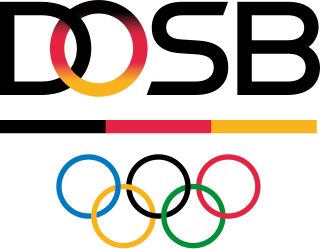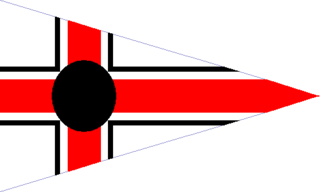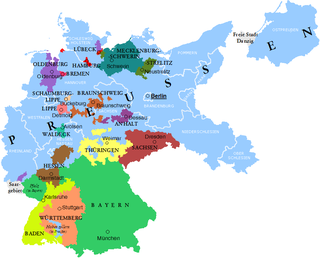History
Cycling associations existed in Germany since 1884. On that year the Bund Deutscher Radfahrer (BDR), "German Cycling Federation", was established in the city of Leipzig. Later other cycling associations or clubs were founded, many of which were active and successful.

The German Cycling Federation or BDR is the national governing body of cycle racing in Germany.

Leipzig is the most populous city in the German federal state of Saxony. With a population of 581,980 inhabitants as of 2017, it is Germany's tenth most populous city as well as the second most populous city in the area of former East Germany after (East) Berlin. Together with Halle (Saale), the largest city of the neighbouring state of Saxony-Anhalt, the city forms the polycentric conurbation of Leipzig-Halle. Between the two cities lies Leipzig/Halle International Airport.
After the Enabling Act of 1933, which legally gave Hitler dictatorial control of Germany, all existing cycling associations were called to split up on their own (Selbstauflösung) before the first semester of 1933 was over. They were then invited to join the Deutscher Radfahrer-Verband, which was the corresponding branch or unit (Fachamt) created by the Nazi Sports office. [1]

The Enabling Act of 1933, formally titled Gesetz zur Behebung der Not von Volk und Reich, was an amendment passed on 23 March 1933 to the Weimar Constitution that gave the German Cabinet — in effect, Chancellor Adolf Hitler — the power to enact laws without the involvement of the Reichstag. The Enabling Act gave Hitler plenary powers and followed on the heels of the Reichstag Fire Decree, which had abolished most civil liberties and transferred state powers to the Reich government. The combined effect of the two laws was to transform Hitler's government into a legal dictatorship.

Gleichschaltung, or in English co-ordination, was in Nazi terminology the process of Nazification by which Adolf Hitler and the Nazi Party successively established a system of totalitarian control and coordination over all aspects of German society and societies occupied by Nazi Germany "from the economy and trade associations to the media, culture and education".
On May 31, 1945, after Nazi Germany's defeat in World War II, the American Military Government issued a special law outlawing the Nazi party and all of its branches. Known as "Law number five", this Denazification decree disbanded the Nationalsozialistischer Reichsbund für Leibesübungen along with all its facilities and departments, which included the Deutscher Radfahrer-Verband.
The Aftermath of World War II was the beginning of a new era, defined by the decline of all European colonial empires and simultaneous rise of two superpowers: the Soviet Union (USSR) and the United States (USA). Allies during World War II, the US and the USSR became competitors on the world stage and engaged in the Cold War, so called because it never resulted in overt, declared hot war between the two powers but was instead characterized by espionage, political subversion and proxy wars. Western Europe and Japan were rebuilt through the American Marshall Plan whereas Central and Eastern Europe fell under the Soviet sphere of influence and eventually behind an "Iron Curtain". Europe was divided into a US-led Western Bloc and a Soviet-led Eastern Bloc. Internationally, alliances with the two blocs gradually shifted, with some nations trying to stay out of the Cold War through the Non-Aligned Movement. The War also saw a nuclear arms race between the two superpowers; part of the reason that the Cold War never became a "hot" war was that the Soviet Union and the United States had nuclear deterrents against each other, leading to a mutually assured destruction standoff.

Denazification was an Allied initiative to rid German and Austrian society, culture, press, economy, judiciary, and politics of the National Socialist ideology (Nazism). It was carried out by removing those who had been Nazi Party or SS members from positions of power and influence and by disbanding or rendering impotent the organizations associated with Nazism. The program of denazification was launched after the end of the Second World War and was solidified by the Potsdam Agreement in August 1945.
The German Cycling Federation was reestablished on 21 November 1948 in West Germany.

West Germany was the informal name for the Federal Republic of Germany, a country in Central Europe, in the period between its formation on 23 May 1949 and German reunification on 3 October 1990. During this Cold War period, the western portion of Germany was part of the Western Bloc. The Federal Republic was created during the Allied occupation of Germany after World War II, established from eleven states formed in the three Allied zones of occupation held by the United States, the United Kingdom and France. Its (provisional) capital was the city of Bonn. The Cold War era West Germany is unofficially historically designated the "Bonn Republic".
In East Germany the cycling section of the Deutscher Sportausschuss, the DDR's sports body, was established in 1946.

East Germany, officially the German Democratic Republic, was a country that existed from 1949 to 1990, when the eastern portion of Germany was part of the Eastern Bloc during the Cold War. It described itself as a socialist "workers' and peasants' state", and the territory was administered and occupied by Soviet forces at the end of World War II — the Soviet occupation zone of the Potsdam Agreement, bounded on the east by the Oder–Neisse line. The Soviet zone surrounded West Berlin but did not include it; as a result, West Berlin remained outside the jurisdiction of the GDR.

The Stahlhelm, Bund der Frontsoldaten was one of the many paramilitary organizations that arose after the German defeat of World War I. It was part of the "Black Reichswehr" and in the late days of the Weimar Republic operated as the armed branch of the national conservative German National People's Party (DNVP), placed at party gatherings in the position of armed security guards (Saalschutz).

The German Football Association is the governing body of football in Germany. A founding member of both FIFA and UEFA, the DFB has jurisdiction for the German football league system and is in charge of the men's and women's national teams. The DFB headquarters are in Frankfurt am Main. Sole members of the DFB are the German Football League, organising the professional Bundesliga and the 2. Bundesliga, along with five regional and 21 state associations, organising the semi-professional and amateur levels. The 21 state associations of the DFB have a combined number of more than 25,000 clubs with more than 6.8 million members, making the DFB the single largest sports federation in the world.

Hans von Tschammer und Osten was a German sport official, SA leader and a member of the Reichstag for the Nazi Party of Nazi Germany. He was married to Sophie Margarethe von Carlowitz.
Felix Linnemann was the fourth president of the German Football Association, the Deutscher Fußball-Bund (DFB), serving from 1925 to 1945.

The German Olympic Sports Confederation was founded on 20 May 2006 by a merger of the Deutscher Sportbund (DSB), and the Nationales Olympisches Komitee für Deutschland (NOK) which dates back to 1895, the year it was founded and recognized as NOC by the IOC.

Arno Breitmeyer was a German sport official. He began his sports career as a successful competition rower. In 1933 he became editor of the sports section of the Völkischer Beobachter.

The Hamburger Segel-Club (HSC), is one of the oldest and most active sailing clubs in Germany. The club is located by the shores of Lake Außenalster, in the heart of the Free and Hanseatic City of Hamburg.

Guido von Mengden (1896–1982) was a German Sports officer. He was a key figure in the Nationalsozialistischer Reichsbund für Leibesübungen (NSRL), the Sports Office of the Third Reich.
The Reichsbund der Deutschen Beamten (RDB), meaning "Reich Federation of German Civil Servants", also known as NS-Beamtenbund, was the trade union for German State Officials during the Third Reich. The RDB was established as an organization affiliated to the Nazi party in October 1933. Its leader was Herman Neef. Neef had been previously leading the RDB's predecessor organisation, Deutscher Beamtenbund German Civil Service Federation, which had been founded in December 1918.

The Brandenburg football championship was the highest association football competition in the Prussian Province of Brandenburg, including Berlin, established in 1898. The competition was disbanded in 1933 with the rise of the Nazis to power.

The German Alpine Club is the world's largest climbing association, and the eighth-largest sports union in Germany. The Club is a member of the German Olympic Sports Confederation, and the responsible body for sport and competition climbing, hiking, mountaineering, hill walking, ice climbing, mountain expeditions, as well as ski mountaineering.
The Arbeiter-Turn- und Sportbund was a national German sports organization active between 1893-1933. The organization actively promoted leftist political views built around class struggle and nationalism.
German Youth Power Sports Association is a Catholic-sponsored sports association in Germany. Founded as a faith-based organization, today it is open to anyone who supports its goals. The concept of Jugendkraft or "youth power" is common to many countries and cultures, as in the Italian Juventus, and conveys the positive aspects of youthful energy and creativity.
The Hessian Football Association, the HFV, is one of 21 state organisations of the German Football Association, the DFB, and covers the state of Hesse.
The Baden Football Association, the BFV, is one of 21 state organisations of the German Football Association, the DFB, and covers the north of Baden, the north-western part of the state of Baden-Württemberg.
This page is based on this
Wikipedia article Text is available under the
CC BY-SA 4.0 license; additional terms may apply.
Images, videos and audio are available under their respective licenses.
















